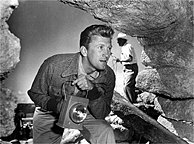Inside Beltway Tops Inside Iraq Reeporting.
Iraqslogger has been featuring a daily count of major newspaper reporting on Iraq, of how many articles are written by commentators in the U.S. versus how many originate from Iraq. Today’s score, for example, “U.S. Papers Sunday: 25-0.” The subtitle, “The Battle in Washington Eclipses the War in Iraq.”
The New York Times and Washington Post are stuffed with Iraq-focused reporting, analyses, and commentaries – 25 in all. Yet, amazingly, not a single one of those original stories comes from Iraq itself (in fairness, there’s a Baghdad-datelined AP report in the NYT). Why? With 140,000 U.S. troops in Iraq, Iraqis and Americans being killed there every day, and with the U.S. troop presence costing American taxpayers hundreds of millions of dollars a day, Americans deserve and need meaty reporting from the war zone daily. And I pity the newspaper correspondents risking life and limb in Iraq only to see their editors opt not to include a single original story from Iraq in the huge Sunday papers (two days straight for the NYT).
Much of this commentary is interesting, and some even positive or constructive. But, when that’s all we get fed by our major media, we are both divorced from a realistic, first-person understanding of the conditions in Iraq, and are more easily swayed by the emotions or bias of editors and commentators ten-thousand miles away from the realities.
Between the dangers of battlefield reporting, the expenses that major media are unwilling to spend, and when they do report from in country so much is derived from often suspect stringers, the American people receive incredibly little original reporting of field conditions, combat results, or the “good news” of reconstruction successes.
Lay on top of that the focus of editors on “inside beltway” and domestic opinion, and their own usually liberal views, as an added filter, and it’s as if all you know of what’s on TV is second and third-hand comments by someone who read a newspaper TV critic’s review of a TV show and is discussing the reactions of other TV critics.
CNN’s Reliable Sources had an interesting exchange (this excerpt delivered to Instapundit) between the Washington Post’s media critic, Howard Kurtz and UPI reporter Pamela Hess. [HT: Antimedia]
KURTZ: Pam Hess, has the sending of 20,000 additional troops gotten a fair hearing in the media or has it gotten caught up in this wrenching, emotional debate about whether the war itself was a mistake?
PAM HESS: I think it's gotten caught up about it, and the debate about it is actually all wrong. What reporters know and what Martha says is that 20,000 really isn't that big -- isn't that big a jump. We're at 132,000 right now. It's going to put us even less that we had going in going across the line.
What we're not asking is actually the central question. We're getting distracted by the shiny political knife fight. What we need to be asking is, what happens if we lose? And no one will answer that question. If we lose, how are we going to mitigate the consequences of this?
It's so much easier for us to cover this as a political horse race. It's on the cover of "The New York Times" today, what this means for the '08 election. But we're not asking the central national security question, because it seems that if as a reporter you do ask the national security question, all of a sudden you're carrying Bush's water. There are national security questions at stake, and we're ignoring them and the country is getting screwed.
This style of reporting, this focus on domestic opinion horseraces, to the neglect of original in-the-field reporting, is not unique to the war in Iraq, or to the newspapers.
For example, the Joyce Foundation sponsored a study by the University of Wisconsin Newslab and the Midwest News Index of the month after Labor Day’s, 2006, TV reporting in the Midwest. An average of 36-seconds per half-hour newscast was about the election, and 63% of that was “strategy and horserace stories [versus] substantive issue coverage.”
If Vietnam was the “television war,” where we at least saw some little of what was happening there, Iraq is the “stringer and editor” war, where we can’t even see with our own eyes and are dependent on those who only tell us what they want us to think.


<< Home